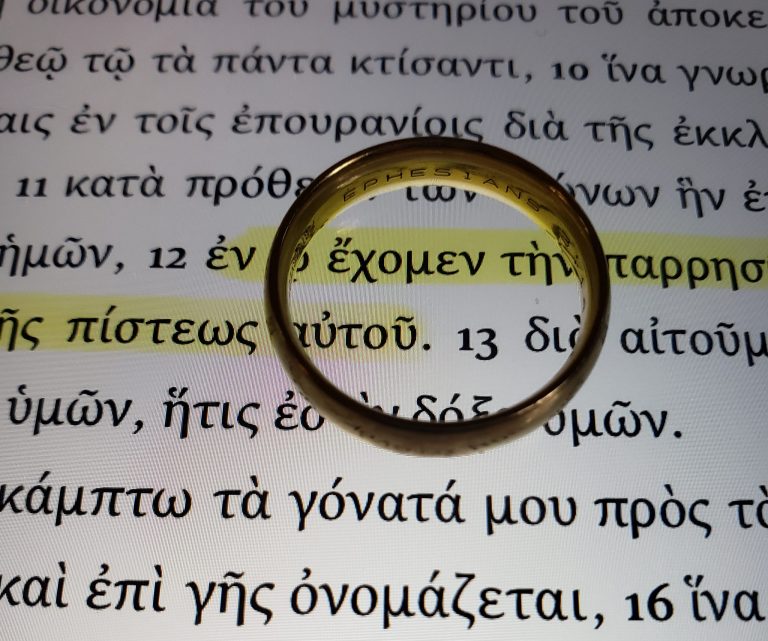Best Pew Bible?
Ken Schenck answers the question of what translation he’d endorse as a pew Bible. I must say that I give him the “Henry Neufeld award” for hedging his answer. For those of you who haven’t met me in real life, I’m known for giving long answers that provide plenty of verbal provisos or footnotes. At one church I attended, the education director called me aside one day to tell me that when church members asked me a question about the Bible they didn’t want a dissertation! My suggestion: Then don’t ask me!
 This applies to any form of the “which Bible version is best” question. It’s nice when people specify “best for …” so at least you can limit it to some extent. Across the front of my little book What’s in a Version? I have the sentence: “The best Bible version is the one you read!”
This applies to any form of the “which Bible version is best” question. It’s nice when people specify “best for …” so at least you can limit it to some extent. Across the front of my little book What’s in a Version? I have the sentence: “The best Bible version is the one you read!”
I’ve had any number of people tell me about the many cases in which that would be wrong. My point is that the Bible is not about possessing it, it’s about reading and absorbing it, and if you don’t read it, forget it. The most theoretically accurate translation is of no value if you can’t or don’t read it.
Even with that on the front of the book, at practically every show where we’ve displayed it, someone asks, “But really, Henry, what is the best Bible version?” The answer: It depends!
So now that I’ve proven I can’t answer a question briefly, what about pew Bibles? I agree with a number of comments that Ken Schenck made in his post, though I would disagree mildly that for detailed study of a text in a class you want a heavily formal equivalence translation. There is a value in such a translation, but in my opinion, there is a great danger in the heavily literal style in that people read it under the impression they’re getting closer to the meaning of the Greek or Hebrew, but they really aren’t.
I’m tempted to suggest that people go from a mildly dynamic translation straight to the original languages. With a dynamic version, you know that the translators are trying to interpret the text and express the thought. In literal translation, all too frequently people believe that interpretation is not taking place, and that if they just have an English word for every Greek and Hebrew word (or a short phrase), they’re getting close. They aren’t.
While I have problems with certain renderings in every translation I own, I don’t find dynamic translations generally weaker in that area. I think those of us who read the original languages regularly tend to understand a literal translation according to what we know the original says, and thus miss the many ways in which someone who isn’t aware of the source text might misunderstand the literal rendering.
My own recommendation regarding a pew Bible would be:
- Give strong consideration to the way the text sounds when read.
- Consider the congregation. An older congregation might be more comfortable with the RSV or even the KJV, though I think the latter can interfere with mission. A very young congregation which includes children in the main service might do well with the CEV. I agree with the NLT as a good pew Bible.
- Consider cost. Some Bibles are printed in economical pew Bible editions.
- Consider what your congregation uses mostly for study. I recall one congregation that ordered NRSV pew Bibles for a congregation that was used to the NIV. The pastor preached from the NIV. The pew Bibles gathered dust.
- Consider not having pew Bibles. Projecting texts on screen is an option, but I would consider skipping that as well. (See below.)
I must confess that I have a serious problem with the whole idea of pew Bibles. I grew up without them. I always had my own Bible. I honestly can’t remember I time when I didn’t. Now I enounter Sunday School classes that have a shelf of Bibles so class members can grab a Bible if they need one. Sunday School in which you might not need a Bible? The idea makes me sick.
The whole notion strikes me as part of worship as a spectator sport. Convenience is OK, but not if it reduces involvement. What about marking one’s Bible? What about gathering questions and getting into discussion? What about looking at the text later when you get home?
So if you want my bottom line recommendation, it would be not to have pew Bibles at all. If you project text on screen, do so only for the scripture reading and for responsive readings (one of the few good reasons for pew Bibles, in my opinion).

